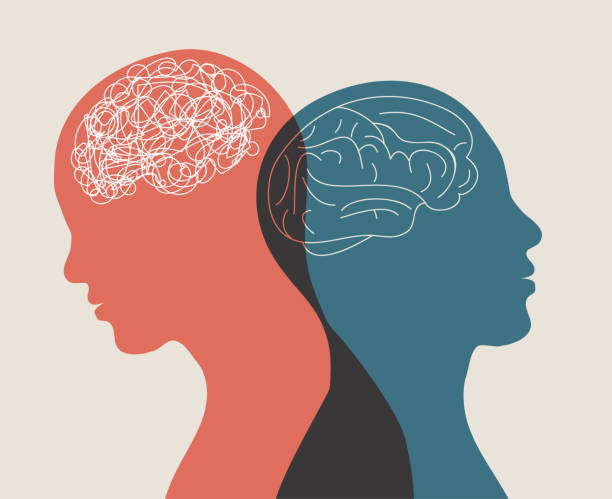What is mental health?

Mental health encompasses our emotional, psychological, and social well-being, influencing how we think, feel, and act in daily life. It plays a crucial role in determining how we handle stress, relate to others, and make choices. Mental health is integral at every stage of life, from childhood through adulthood, impacting various aspects such as relationships, work, and physical health. A person’s mental state can be influenced by a multitude of factors, including genetics, brain chemistry, trauma, and life experiences. The World Health Organization defines mental health as a state in which an individual realizes their abilities, can cope with the normal stresses of life, works productively, and contributes to their community. Good mental health is characterized by a sense of well-being and the ability to lead a fulfilling life. It involves a balance in emotional states, the capacity to manage thoughts and emotions effectively, and the ability to form and maintain relationships. Conversely, poor mental health can manifest in emotional disorders, such as anxiety and depression, which can lead to feelings of hopelessness, isolation, and a decreased quality of life. Mental health difficulties can disrupt daily functioning, making it hard to carry out routine tasks and maintain relationships. Several factors contribute to mental health, including biological factors such as genetics, family history of mental health issues, and brain chemistry. Life experiences, such as trauma, abuse, and significant life changes, can also significantly impact mental well-being. Moreover, social conditions, including poverty, discrimination, and lack of support systems, can exacerbate mental health challenges. To improve one’s mental health, it is essential to focus on wellness strategies, such as regular physical activity, a balanced diet, sufficient sleep, and mindfulness practices. Engaging in hobbies, connecting with nature, and maintaining strong social connections are also vital for bolstering mental well-being. Awareness about mental health has grown considerably in recent years, sparking discussions around its importance and addressing the stigma associated with mental illness. People are becoming more open to understanding that mental health is as vital as physical health, fostering environments where individuals feel comfortable seeking help without fear of judgment. Education about mental health is critical, as it helps individuals recognize signs of distress within themselves and others, leading to earlier intervention and more effective treatment options. Treatment for mental health conditions varies widely and can include psychotherapy, medication, lifestyle changes, and support groups. Psychotherapy, or talk therapy, allows individuals to work through issues with a qualified mental health professional, providing tools and strategies for managing distress. Medications can be prescribed to help balance chemicals in the brain, alleviating symptoms of conditions such as depression and anxiety. Lifestyle changes—involving proper nutrition, exercise, mindfulness, and adequate rest—can also play a substantial role in enhancing mental health. Support networks, including friends, family, and community resources, are vital components of mental health recovery. Being connected to others can provide emotional support, encouragement, and a sense of belonging, which are essential for positive mental health outcomes. Overall, mental health is a critical, yet often overlooked, aspect of overall wellness. Recognizing the importance of mental health can lead to broader societal changes, reducing stigma and promoting understanding. It is essential that individuals prioritize their mental health and seek professional help when needed, fostering a more compassionate and supportive environment that encourages mental resilience. By equipping ourselves with knowledge and resources, we can effectively combat mental health challenges, support those in need, and pave the way for a healthier society.
Mental health is influenced by a complex interplay of various factors, which include biological, psychological, social, and environmental aspects. At the biological level, genetics play a significant role; individuals with a family history of mental health disorders may be at a higher risk due to inherited traits. Neurotransmitter imbalances, hormonal changes, and brain structure abnormalities can also contribute to mental health issues. For example, conditions such as depression and anxiety often involve fluctuations in serotonin and dopamine levels, which impact mood regulation. Psychological factors are equally critical. Past trauma, whether from childhood abuse, neglect, or life-threatening events, can have lasting effects on mental well-being. These experiences can lead to conditions like PTSD and anxiety disorders. Additionally, personality traits, such as low self-esteem or high levels of neuroticism, often predispose individuals to mental health struggles. Cognitive patterns, including negative thinking styles and maladaptive coping mechanisms, can perpetuate feelings of hopelessness and despair, further worsening one’s mental state. Social influences greatly impact mental health as well. Relationships and social support systems play a crucial role in an individual’s ability to cope with stress. A supportive network of friends and family can provide emotional assistance and practical help during difficult times. Conversely, social isolation and loneliness are significant risk factors for mental health issues, with studies showing that lacking social connections can lead to increased symptoms of anxiety and depression. Bullying, discrimination, or stigma can compound these feelings, making individuals feel alienated and hopeless. Environmental factors also contribute significantly to mental health. Economic stability is closely linked to mental well-being; financial stressors, unemployment, or job insecurity can lead to anxiety and depression. Likewise, living in an unsafe or unstable environment, whether due to crime, violence, or natural disasters, can create chronic stress and contribute to mental health decline. Access to healthcare resources and services also plays a vital role in shaping mental health outcomes. Limited access to mental health care due to geographical, financial, or systemic barriers can prevent individuals from receiving the support they need. Lifestyle choices are instrumental in influencing mental health outcomes. Regular physical activity is linked to improved mood and reduced symptoms of anxiety and depression, as exercise releases endorphins and fosters social interaction. On the contrary, substance abuse can lead to significant mental health issues, creating a vicious cycle of dependency and exacerbating existing conditions. Furthermore, nutrition plays a crucial role; diets high in processed foods and sugars may correlate with increased rates of mental disorders, while a balanced diet rich in omega-3 fatty acids and vitamins supports overall mental wellness. Sleep quality cannot be overlooked as a factor affecting mental health. Insufficient or poor-quality sleep can contribute to a range of mental health disorders, including anxiety and depression, while good sleep hygiene is essential for emotional regulation and cognitive function. Stress management techniques such as mindfulness, yoga, and meditation have shown positive effects on mental health by promoting relaxation and resilience against life’s challenges. Lastly, societal factors, such as cultural expectations and values, influence mental health perceptions and care. Societal attitudes towards mental illness can either facilitate help-seeking behavior or inhibit it, affecting how individuals perceive their own mental health conditions and the stigma they might face. Educational initiatives to destigmatize mental health issues are essential in creating a more supportive environment for those struggling. In conclusion, mental health is a dynamic interplay of various factors, including biological, psychological, social, environmental, lifestyle choices, and societal influences. Understanding this multifaceted nature can lead to more effective interventions and a holistic approach to nurturing mental well-being in individuals and communities alike. Collaboration among healthcare providers, educators, and the public is crucial to address these factors comprehensively for better mental health outcomes.
PEER RELATIONSHIPS Peer relationships play a key role in the lives of young people. During adolescence, when identity and individuality are developing, interactions with peers have the strongest impact on mood and stress levels. One of the main sources of stress in peer relationships is social expectations. Young people often feel pressure to conform to group norms, which can lead to internal conflicts. Uncertainty about being accepted, fear of rejection or comparison with others can generate severe stress. Also, arguments, gossip or social ostracism affect feelings of security and belonging. In extreme cases, such situations can lead to lower self-esteem and anxiety. How to deal with stress in peer relationships? Developing communication skills: Good communication skills help you express your emotions and needs. Learning to be assertive allows you to better handle difficult situations, minimizing the risk of tension and misunderstanding. Finding support: It is important to surround yourself with people who are kind and supportive. Seeking friendships in groups that share similar interests can significantly reduce stress levels. Empathy toward others: Trying to understand the perspective of others can ease tensions in relationships. Empathy helps build stronger relationships and better manage conflict. Relaxation techniques: Breathing techniques, meditation or physical activity can be helpful in stressful situations. Regular exercise releases endorphins, which has a positive effect on mood and reduces stress. Time management: Organizing your time and planning your activities promotes a sense of control and calm. In a flurry of school and social obligations, prioritizing can help avoid feeling lost and overwhelmed. Seek help: If the stress of peer relationships is becoming unbearable, consider talking to a trusted adult, teacher or psychologist. Sometimes an objective perspective can provide valuable guidance and support. The key is to develop interpersonal skills, build social support and learn to manage emotions. Understanding yourself and others is a step toward healthier, more satisfying relationships.


What can be done in case of a mental breakdown? A HELPLINE A helpline is a special hotline that offers emotional, psychological or informational support for people in difficult situations. It acts as a safe place where people can talk anonymously about their problems, concerns or crises. Callers can get help with a variety of issues, such as: Emotional problems (depression, anxiety) Life crises (e.g., loss of a loved one, relationship difficulties) Family or school problems Situations related to violence, addiction or mental health These lines are staffed by qualified professionals, such as psychologists or therapists, who offer support, listen without judgment and help find appropriate solutions or resources. Helplines are particularly important because they can be a first step for people who do not have access to other forms of support, or who feel too insecure to seek help in person. polish helpline number: 116 111
Where to seek mental health help in Greece and Poland? With growing awareness about mental health, more and more people are seeking support during difficult times. In both Greece and Poland, there are many places and resources that can help. Here are some tips on where to look for mental health help in both countries. Greece 1. Mental Health Centers (Κέντρα Ψυχικής Υγείας). Greece has public mental health centres that offer free assistance. Specialists such as psychologists and psychiatrists can be accessed there. 2. Psychiatric Hospitals There are psychiatric hospitals in larger cities that provide comprehensive care. It is worth noting their availability and offerings. 3. Private Specialists There are many private psychologists and psychiatrists in Greece. Prices for visits can vary, but they often offer flexible appointment times and a personalised approach. 4. Non-Governmental Organisations Many NGOs in Greece are concerned with mental health, offering psychological support and support groups. An example is “The Hellenic Psychological Society,” which runs various programs and initiatives. 5. Helpline Greece has support lines that are available 24/7. You can contact a psychologist or other specialist in difficult situations.
Poland 1. Mental Health Clinics In Poland, you can use public mental health clinics that offer psychological and psychiatric help. It is important to have a referral from your family doctor. 2. Private Clinics More and more Poles are using private services of psychologists and psychiatrists. The cost of visits may be higher, but it is often possible to get a faster appointment for a consultation. 3. Foundations and Non-Profit Organisations There are a number of foundations that offer mental health support, such as “Psychologists in Crisis” and “Ithaca Foundation.” They offer crisis assistance and support groups. 4. Support lines As in Greece, there are helplines available for anonymous help. It is useful to know the numbers, such as 116 123, which offer psychological support. 5. Online platforms
More and more people are taking advantage of online therapy. There are a number of platforms in Poland that connect patients with therapists, which is a convenient option for those who prefer remote consultations.
Diet plays a significant role in mental health, affecting our mood, energy levels, cognitive abilities and overall well-being. A growing body of research shows that diet can be an important factor in both preventing and treating mental disorders such as depression, anxiety and stress. There is a strong connection between the gut and the brain, called the gut-brain axis. The health of the gut microbiome can affect brain function, mood and stress levels. A diet rich in probiotics (e.g., yoghourts, pickles) and prebiotics (fibre from vegetables and whole grains) supports the development of healthy gut bacteria, which can improve mental health. A plant-based diet, based mainly on vegetables, fruits, whole grains, nuts, seeds and legumes, may have beneficial effects on mental health. A growing body of research shows links between a plant-based diet and improved mood, reduced risk of depression and better overall well-being. Benefits of a plant-based diet for mental health: 1. Abundance of nutrients to support brain function – B vitamins (e.g. B6, B9 – folic acid): Found in abundance in legumes, green leafy vegetables and whole grains, these vitamins are key to the production of neurotransmitters such as serotonin and dopamine, which affect mood. – Magnesium: Legumes, nuts and seeds are rich sources of magnesium, which helps regulate mood, reduce stress and support nervous system function. – Polyphenols and antioxidants: Fruits and vegetables, especially those with intense colours (e.g., berries, spinach), are rich in antioxidants that reduce oxidative stress in the body and can protect the brain from cellular damage, which benefits mental health. 2. Effects on the gut microbiome A plant-based diet, particularly one rich in fibre, supports the health of the gut microbiome, which has important implications for the gut-brain axis. Research suggests that a healthy gut microbiota can influence the production of neurotransmitters such as serotonin, which regulates mood. A healthy microbiome is also associated with a lower risk of mood disorders, including depression and anxiety. 3. Omega-3 fatty acids from plants Although plant-based diets are generally deficient in long-chain omega-3 fatty acids (EPA and DHA, which are mainly found in fish), you can get their precursor, alpha-linolenic acid (ALA), from plants such as flaxseed, chia seeds and walnuts. ALA can be partially converted to EPA and DHA in the body, although to a limited degree. An omega-3 deficiency is associated with a higher risk of depression, but a well-planned plant-based diet can cover the need for these acids. 4. Lower intake of trans and saturated fats People who follow a plant-based diet tend to consume less saturated and trans fats, which can negatively affect brain health and are associated with a higher risk of depression. Instead, this diet provides healthy plant-based fats that support brain function. 5. Stabilise glucose levels Plant-based diets, especially those based on whole grains and rich in fibre, help stabilise blood sugar levels. Stable glucose levels can improve mood and prevent sudden changes in energy and irritability that can result from sudden fluctuations in sugar levels. 6. Reducing the risk of inflammation Inflammation in the body is increasingly being linked to mental disorders, including depression. A plant-based diet, rich in antioxidants and fibre, has anti-inflammatory effects, which can reduce the risk of inflammation affecting brain health.
Overall, adopting a plant-based diet can provide essential nutrients that support brain function, promote a healthy gut microbiome, stabilize mood, and reduce inflammation—all factors that contribute to better mental health. This dietary approach not only aids in preventing mental disorders but also supports overall well-being, highlighting the intricate connection between what we eat and how we feel..
Foods that can support serotonin production in the body: 1. Foods rich in tryptophan Tryptophan is an amino acid that converts to serotonin in the brain. It is necessary for the synthesis of this neurotransmitter, but the body is unable to produce it on its own, so it must be supplied from food. – Nuts and seeds (almonds, chia seeds, pumpkin seeds, walnuts), – tofu and other soy products (tempeh, edamame), – fish and seafood (salmon, tuna, cod), – eggs, – legumes (peas, beans, lentils), – whole grains (oats, barley, quinoa). 2. Complex carbohydrates Carbohydrate consumption increases insulin secretion, which helps transport tryptophan to the brain, where it can be converted into serotonin. It is worth choosing complex carbohydrates, which stabilise blood sugar levels and promote a steady release of energy. – Whole grains (brown rice, oatmeal, whole-grain bread), – starchy vegetables (potatoes, yams, pumpkin), – legumes (beans, lentils). 3. Products rich in omega-3 fatty acids Omega-3 fatty acids, especially EPA and DHA, are important for brain health and can promote serotonin production and improve communication between nerve cells. – Oily fish (salmon, mackerel, sardines, tuna), – chia seeds and flaxseeds, – walnuts. 4. Fermented products Probiotics present in fermented foods support gut health, which has a direct impact on serotonin production, since much of this neurotransmitter is synthesised in the gut. – Pickles (sauerkraut, kimchi), – natural or coconut yoghourt enriched with bacterial cultures, – kefir, – miso and tempeh. 5. Bananas Bananas are a natural source of tryptophan and B vitamins, which are essential for serotonin production. They also contain carbohydrates that can help transport tryptophan to the brain. 6. Dark chocolate Dark chocolate, rich in cocoa (at least 70%), contains compounds that can increase serotonin levels in the brain. It also contains tryptophan and other compounds, such as flavonoids, which improve mood and promote brain health. 7. Nuts and seeds Walnuts, almonds, sunflower seeds: rich in tryptophan and healthy fats that can support brain health and serotonin production. 8. Pineapple Pineapple is a source of tryptophan and bromelain, an enzyme that may support mental health, although research on this is still in its early stages. 9. Spinach and other green leafy vegetables Green leafy vegetables such as spinach are rich in magnesium, which promotes serotonin production and helps reduce stress and improve mood. 10. Antioxidant-rich fruits Fruits rich in antioxidants, such as berries, strawberries, raspberries and citrus, can protect the brain from oxidative stress, promoting neuronal health and serotonin production.


In today’s world, where the pace of life is constantly increasing and stress and tension are becoming a daily occurrence, taking care of mental health is vital. Just like taking care of the body, taking care of mental health is crucial to our well-being and quality of life. Here are some practical tips that can help you take care of your mental health. 1.Understanding your emotions The first step in taking care of your mental health is to understand your emotions. We can often feel overwhelmed by the feelings we experience. It is crucial not to ignore your emotions, but instead try to recognize and analyze them. Keeping a journal of your emotions can be helpful. Write down what you are feeling at any given time and what situations trigger those emotions. Over time, you will notice patterns that will help you understand yourself better. 2. regular physical activity Physical activity has a huge impact on mental health. Studies show that regular exercise can help reduce symptoms of depression and anxiety. Choose a form of activity that you enjoy – it could be jogging, yoga, dancing or even a walk in the park. It is important to find time to move at least a few times a week. 3. a healthy diet What we eat has a direct impact on our mood. A diet rich in fruits, vegetables, whole grains and healthy fats can support our mental health. A balanced diet provides essential nutrients that affect the functioning of the 4. sleep Sleep is a key component of mental health. Lack of adequate sleep can lead to decreased mood, increased susceptibility to stress, and problems with concentration. Try to maintain a regular sleep schedule, going to bed and waking up at the same times. It’s also a good idea to ensure proper sleeping conditions – a comfortable bed, a dark and quiet room. 5. mindfulness practice (mindfulness) Mindfulness is a technique that involves being present in the moment and accepting your thoughts and feelings without judgment. Practicing mindfulness can help reduce stress and improve mental well-being. You can start with simple exercises such as meditation or deep breathing. Even a few minutes a day can bring positive results. 6 – Build strong relationships Relationships with other people are very important for mental health. Being in the company of close people, talking and sharing experiences can bring relief during difficult times. Don’t be afraid to ask for help and support – both from friends and professionals – if you feel the situation is overwhelming you. 7. reducing stress Stress management is key to mental health. Try to identify sources of stress in your life and look for ways to reduce them. This could include organizing daily tasks, delegating responsibilities or learning relaxation techniques. It’s also a good idea to find time to relax – whether it’s reading, listening to music or spending time in nature. 8 Set goals Setting goals, both short-term and long-term, can be motivating and give you a sense of accomplishment. Think about what you would like to achieve, and break down your goals into smaller steps. Achieving small goals on a regular basis can increase self-esteem and satisfaction. 9 Avoid stimulants Alcohol, nicotine and other substances can have negative effects on mental health. Although they can bring temporary relief, long-term they lead to a deterioration of well-being. Try to limit their consumption and look for healthier alternatives to deal with stress. 10. seeking professional help There is nothing wrong with seeking help from professionals, such as a psychologist or therapist. Sometimes talking to someone with the right knowledge and experience can bring relief and a new perspective on problems. Don’t hesitate to ask for help if you feel you are not coping on your own.
Summary
Taking care of mental health is a process that requires commitment and patience. It’s worth remembering that everyone is different, and what works for one person won’t necessarily be effective for another. The key is to experiment with different methods and find the ones that best suit your needs. Remember that mental health is just as important as physical health, and investing in yourself has long-term benefits. Take care of yourself and give yourself time to rest and recuperate!
In a fast-paced world, taking a moment for silence and reflection is becoming more and more common. Meditation and various relaxation techniques can help you disconnect and experience emergency release. Here are some practices worth implementing. Meditation is one of the most popular calming techniques. There are many forms of it, but the basic principle remains the same: focusing attention on the present. Mindfulness meditation involves observing your thoughts and feelings without judging them. All you need is a comfortable place, a few minutes a day and the will to relax. How to start? Choose a place: Find a quiet place where you won’t be disturbed. Sit comfortably: You can sit on the floor, a chair or even lie down. Focus on your breathing: Close your eyes and pay attention to your breathing. Inhale and exhale slowly, concentrating on each moment. Observe your thoughts: When thoughts arise, simply notice them and return to your breathing. Breathing exercises Breathing exercises are a simple and effective way to calm your mind. They can be performed anywhere and anytime. One popular technique is “4-7-8”: Inhale through your nose for 4 seconds. Hold your breath for 7 seconds. Exhale slowly through your mouth for 8 seconds. Repeat a few times and you will feel the tension disappear. Yoga combines movement, breathing and meditation. Practicing yoga regularly helps achieve both physical and mental balance. Many people use yoga to increase body flexibility and calm the mind at the same time. How to start? Create space: Prepare a mat and ensure a comfortable environment. Focus on your breathing: Remember to synchronize your movements with your breathing. Meditative walking Walking meditation is another way to practice mindfulness. It is a combination of movement and meditation that can be performed outdoors or in a closed space. How to do it? Choose a route: It could be a park, a garden or a quiet corridor. Focus on each step: Instead of thinking about everyday matters, focus on the sensations in your feet and the movement of your body. Observe your surroundings: Notice the sounds, smells and colors around you. Summary Meditation and calming exercises are a great way to improve your mental and physical health. Finding some time for yourself, even on the busiest day, can bring huge benefits. Regardless of whether you decide to practice meditation, yoga, breathing exercises or meditation walking, remember that the most important thing is regularity and the willingness to get to know yourself. Introducing these practices into your daily life can help you achieve the peace and balance that are so needed in today’s world.


Is depression a disease? Understanding the problem in the light of scieantific research Depression is one of the most common mental disorders, affecting millions of people around the world. The answer to the question of whether depression is a disease is not as simple as it may seem. We will explore this issue in the context of scientific research, medical definitions, and the symptoms, causes, and treatments of depression. 1. Definition of depression According to the DSM-5 classification (Diagnostic and Statistical Manual of Mental Disorders, 5th Edition), depression is considered a mood disorder characterized by chronic feelings of sadness and loss of interest and pleasure in everyday activities. Depression can be classified into different types, including unipolar depression (the most common) and bipolar depression, which also includes manic episodes. 2. Depression as a disease a) Biological basis of depression Scientific research has shown that depression has a biological basis. For example, changes in the levels of neurotransmitters such as serotonin, dopamine and norepinephrine have a significant impact on mood and emotions. In research conducted by M. R. A. H. M. van Praag et al. (2002) found that neurotransmitter imbalances can lead to the development of depression, suggesting that depression is not only an emotional state, but also a disease with a biological basis. b) Genetics Genetic studies show that depression may be hereditary. In family studies, such as those conducted by Sullivan, Neale, and Kendler (2000), the risk of developing depression has been shown to be higher in people who have close relatives with a history of depression. Twin studies indicate that genes may play a key role in susceptibility to depression, underscoring its disease nature. 3. Symptoms of depression Depression is characterized by a variety of symptoms that can significantly impact the quality of life. The most common symptoms include: – Feeling sad or empty. – Loss of interest and pleasure in daily activities. – Sleeping problems (insomnia or excessive sleepiness). – Changes in appetite and weight. – Difficulty concentrating and making decisions. – Feelings of worthlessness or excessive guilt. These symptoms may vary from person to person and their intensity may change over time. 4. Causes of depression a) Psychological factors Psychological factors such as low self-esteem, childhood trauma and chronic stress can significantly influence the development of depression. Research shows that people who have experienced trauma are more likely to develop depression. For example, the work of B. D. W. W. H. J. Kessler (1995) showed that trauma can lead to emotional disorders, including depression. b) Social factors Social factors such as isolation, financial problems, and difficulties in interpersonal relationships may also contribute to the development of depression. Research conducted by H. S. H. J. B. M. M. Koenig et al. (2001) showed that people with strong social support networks were less likely to experience depression. 5. Treatment of depression Treating depression is a key aspect of managing this disorder. There are many therapeutic methods that can help people with depression. a) Psychotherapy Psychotherapy, including cognitive behavioral therapy (CBT), is one of the most effective forms of depression treatment. Research conducted by Hofmann, Asnaani, and Vonk (2012) showed that CBT can effectively reduce symptoms of depression as well as improve overall well-being. b) Drug therapy Antidepressants such as selective serotonin reuptake inhibitors (SSRIs) also play a key role in the treatment of depression. Clinical studies such as those published by Nierenberg et al. (2007), confirm the effectiveness of medications in alleviating depressive symptoms. c) Alternative therapies Some people use alternative therapies such as meditation, yoga or acupuncture, which can support the treatment of depression. Although research on their effectiveness is limited, some studies suggest positive effects. 6. Stigmatization of depression Even though depression is considered a disease, many people still struggle with its stigma. The social perception of depression as a “weakness” makes it difficult for sick people to seek help. Research by Corrigan and Watson (2002) shows that stigmatization can lead to social isolation and deterioration of mental health. 7. Why is depression considered a disease? Depression is considered a disease because it meets many medical criteria: a) Symptoms: As mentioned earlier, depression has a complex set of symptoms that can be chronic and debilitating. b) Biological basis: Research shows that depression has a biological and genetic basis, making it similar to other diseases. c) Treatment: There are effective treatments for depression that help people suffering from this disorder. 8. Conclusions To sum up, depression is a serious illness that requires understanding and support. Scientific research clearly indicates its biological, genetic and psychological basis. Early intervention, therapy and social support can help people struggling with depression recover. It is worth remembering that depression is not just a temporary crisis, but a serious disorder that deserves our attention and understanding. Ultimately, tackling the stigma of depression and promoting open discussion about mental health are key to creating a more supportive society where everyone who suffers can find help and hope.
We made some field games at the “Sun Beach” hotel in Platamonas in Greece. We encourage you to try it out if you ever get a chance to stay around there. Each of the games are fun to play with your friends and are a great way to get to know your surroundings.
All the games are made by different people so they wont be too similar. Have fun with them!
Here are the QR codes you can scan with an app called “action bound” and play them. We wish you luck!









